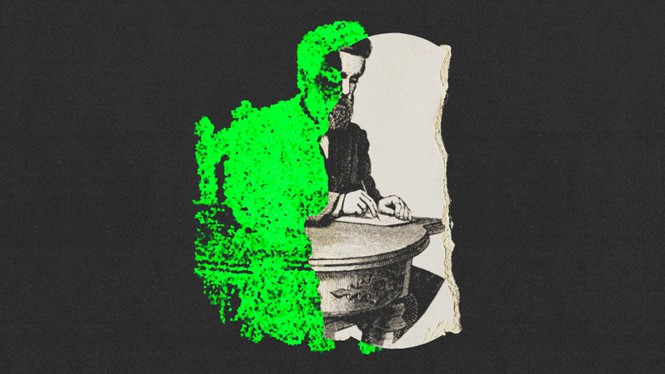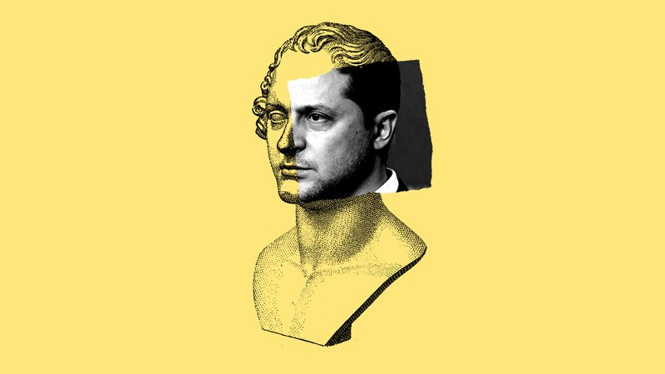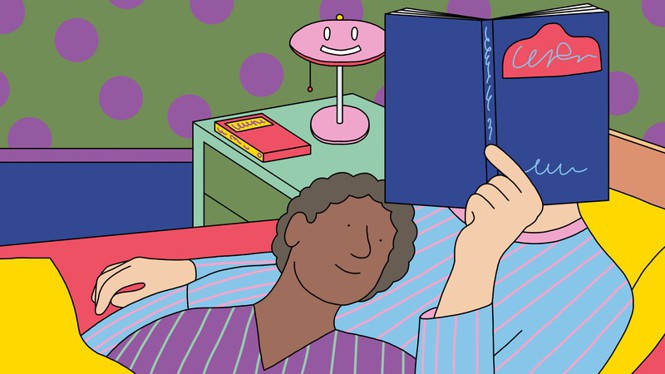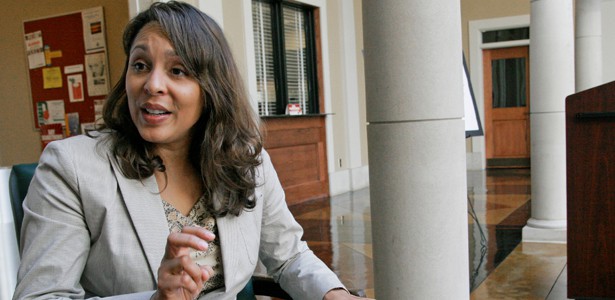
The AI tool ChatGPT is hardly a poet, my colleague Walt Hunter wrote this week. It may be able to spit out rhyming English verse, but it lacks the “ineffable sense” that’s required to transmute language into something brilliant. Nor does it have the creativity or discernment needed to contribute in a meaningful way to the long, impressive, and deeply human tradition of poetry.
But even for people, poems can be hard to fully understand. As Hunter explains, rather than focusing on whether a poem is “good” or “bad,” readers should seek out the authentic inspiration behind it; the key is that the author feels a “necessity to speak a truth.” So even Ukrainian President Volodymyr Zelensky’s rousing but ordinary words approach the level of poetry, Susan J. Wolfson writes. Speaking after his country was invaded by Russia last year, he “grasps the power of a pileup, the inspiration by repetition that calls everyone into the plural,” she says.
Mark Yakitch offers readers guidance for sitting with a poem, acknowledging that many are “perplexed” by verse. To combat this confusion, we should do simple things such as look up the words we don’t recognize and take notes in the margins. And crucially, he urges, we should read poems aloud. This is good advice for anyone: This week, Arthur Brooks proposed a simple Valentine’s Day activity. “Read your partner poetry of love while holding their hand, until they fall asleep,” he insists, urging us to tap into the form’s deep, irreplaceable sense of tradition and romance.
Poetry lets us express the depths of our love and our grief. In 2012, Natasha Trethewey explained how she wrote her poem “Elegy,” about the growing distance between herself and her father, another writer. In the end, what she leaves out is as important as what she leaves in. Because both father and daughter write about each other, exposing their relationship to scrutiny, Trethewey acknowledges that “we’re having a very intimate conversation in a very public forum.” So she decides to keep some things from the reader. What she reveals, in the final draft, is this: “You kept casting / your line, and when it did not come back / empty, it was tangled with mine.”
Every Friday in the Books Briefing, we thread together Atlantic stories on books that share similar ideas. Know other book lovers who might like this guide? Forward them this email.
When you buy a book using a link in this newsletter, we receive a commission. Thank you for supporting The Atlantic.
What We’re Reading

Getty; The Atlantic
“The difference between ChatGPT’s Heaney-esque poem and Heaney’s actual poem is not simply that one is bad and one is good, or that one is sentimental and one is elegiacally beautiful. The difference is that Heaney lost his mother, and the poem expresses the emotional urgency of this fact during a reflective moment sometime after the event. Heaney’s poem carries the ineffable sense that the poet has not only pillaged from the horde of words that already exist but has also worked on them himself, claiming them partly as his and partly as a treasure loaned to him from centuries of poetry written in English.”

Adam Maida / The Atlantic; Ukrainian Presidency / Handout / Anadolu Agency
Byron, Shelley, and now Zelensky
“Zelensky grasps the power of a pileup, the inspiration by repetition that calls everyone into the plural. Audaciously on the streets of Kyiv, from the city’s undisclosed bunkers, on the global airwaves, on the screens of statehouses, he channels Thomas Paine, Winston Churchill, and John F. Kennedy.”

Arnd Wiegmann / Reuters
“But what if the fine art of reading poetry isn’t so fine after all? What if the predicament about poems is precisely our well-intentioned but ill-fitting dispositions toward reading them?”

Jan Buchczik
An old romantic custom we should bring back
“Poetry, after all, is practically synonymous with romance, having narrated the experience of love throughout the ages. For a truly personal touch—something you won’t find on any shelf—reading poetry to your beloved can turn a tired holiday into a bespoke performance of your affection.”

AP Images
How poet laureate Natasha Trethewey wrote her father’s ‘Elegy’
“I wanted the poem to feel sinewy, like a fishing line, which is why there’s a step-down second line that moves away from the first line. Something felt right about it, so the poem never went through any other stanza patterns. That may be an influence from the Claudia Emerson poem. Once I’d filtered the material into that form, it clicked. It was like putting the key in the right lock.”
About us: This week’s newsletter is written by Emma Sarappo. The book she’s reading next is The Wolf Age, by Tore Skeie.
Comments, questions, typos? Reply to this email to reach the Books Briefing team.







